|
| |
|
Keynotes & Panels
16th International System-on-Chip
(SoC)
Conference, Exhibit & Workshops
The Theme for This Year’s
Conference Is “Silicon Engineering an Automated World."
|
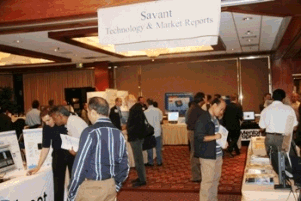
|
|
To present and/or exhibit at this
highly-targeted International System-on-Chip (SoC) Conference, please contact:
949-981-1837 or MySoCconference@Gmail.com |
|
a
|
a
Click Here To
Download The UCI Campus Map
Directions &
Parking for Calit2 Building at the University of California, Irvine (UCI)
a
Platinum Sponsors
a
| |
|
|
|
|
|
|
|
Schedule & Program Summary
|
|
|
|
|
SoC Conference Day 1 |
Wednesday, October 17, 2018
UCI - Calit2 Building |
8:00 am - 6:30 pm |
|
|
|
SoC Conference Day 2 |
Thursday, October 18, 2018
UCI - Calit2 Building |
8:00 am - 6:30 pm |
|
|
|
SoC Student Design Contest &
Reception at 5:30 pm (open to public) |
Wednesday, October 17, 2018
UCI - Calit2 Building |
2:00 pm - 7:00 pm |
|
| |
|
|
|
|
a
|
|
LG Electronics Mobile Communications
Keynote

|
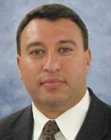 Dr.
Yasser Nafei, Senior Vice President LG Electronics Mobile Communications. Dr.
Yasser Nafei, Senior Vice President LG Electronics Mobile Communications.
“Accelerating the adoption of
5G: The journey towards a consumer centric vocabulary"
Abstract: TBA.
Bio: Yasser Nafei currently
serves a Senior Vice President and division head at LG Electronics. Dr.
Nafei joined LG in 2010 and currently oversees strategy, sales and business
development for mobile business unit. In his current role, he is responsible
for developing, communicating and executing LG strategy, business plans,
product and technology roadmaps and go to market activities. Throughout his
career, Dr. Nafei previously held senior management positions at Alcatel,
IBM, Motorola, Nortel and Tellabs. His global assignments include research &
development, technology strategy, mergers & acquisitions, sales & marketing
along with quality and service operations. Dr. Nafei holds a
Bachelor’s and a Masters’ degrees in Electrical Engineering from Ain Shams
University in Egypt, a Master of Science in Telecommunications from INRS
Canada, and a Ph.D. in Organization Development from Benedictine University
in the United States. He is the author of several business books including
“Corporate Dictatorship ISBN 978-0982328743 and Corporate Spring ISBN
978-0982328750. He is a published writer and lecturer in future technology
trends, consumer centric research, corporate governance, business turnaround
strategies, conflict management, customer advocacy and mergers &
acquisitions.
|
|
|
|
ON Semiconductor
Keynote

|
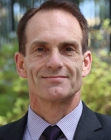 Dr.
Hans Stork, Senior Vice President and Chief Technology Officer (CTO), ON
Semiconductor. Dr.
Hans Stork, Senior Vice President and Chief Technology Officer (CTO), ON
Semiconductor.
"Autonomous driving: where
distributed and local systems find their optimum configuration"
Abstract: The benefits
of improved cost and reliability have long been the driver of monolithic
integration. Individual devices are powered today by SoCs built in 10nm or
better process technologies. With lithography continuing to improve, further
digitization can be expected. Most of the functions that can be mapped into
the digital domain, should be integrated monolithically. However, any
associated memories require their own process and should be integrated at
the board or package level to satisfy bandwidth and power constraints. When
it comes to sensors or actuators, the unique processes are not compatible
with the low voltage digital domain. Fortunately, stacking of dies and
wafers has become practical, and provides much upside to optimizing each
process for its main function, whether that be photon capture, or power
control or management. In other words for sensor and actuator functions, SiP
is a key method to integrate heterogeneous processes into the smallest,
cheapest, highest performance packages. We will illustrate a few examples to
highlight the varied requirements and choices: from image sensors for
autonomous driving applications that require high dynamic range, at high
speed, and high pixel density, to intelligent motor control with local,
efficient power conversion using both discrete and mixed-signal processes
and devices.
TBD.
Bio: Dr. Hans Stork is Senior
Vice President and Chief Technology Officer (CTO) at ON Semiconductor. He
oversees the development of wafer process technologies, modeling and design
kits, design libraries, as well as packaging technologies and assembly
support. Prior to joining ON Semiconductor, Dr. Stork was Group Vice
President and CTO of the Silicon Systems Group at Applied Materials. From
2001 to 2007 he was Senior Vice President and the CTO of Texas Instruments.
Before that, Dr. Stork held various R&D and management positions at Hewlett
Packard Laboratories and at IBM’s T.J. Watson Research Center. Dr. Stork
serves on the supervisory board of ASML, is a member of the Scientific
Advisory board at IMEC, and has previously served on the boards of Sematech
and the SRC. He is also a longstanding member of the SIA Technology Strategy
Committee. He authored more than 100 cited papers and holds 11 U.S.
patents. He was elected IEEE Fellow in 1994, and served on several IEEE
sponsored conference program committees, and is currently vice-chair of the
Technical Field Awards Council and a member of the Awards Policy and
Portfolio Review Committee. Dr. Stork was born in Soest, The
Netherlands, and received the Ingenieur degree in electrical engineering
(EE) from Delft University of Technology, Delft, The Netherlands, and holds
a PhD in EE from Stanford University.
|
|
|
|
NXP Semiconductor
Keynote

|
 Dr.
Robert Oshana, Vice President Software Engineering Research and Development,
Microcontroller Group. Dr.
Robert Oshana, Vice President Software Engineering Research and Development,
Microcontroller Group.
"RISC-V; is this the Linux
of CPU’s?"
Abstract: RISC-V is a free and
open ISA enabling a new era of processor innovation through open standard
collaboration. The RISC-V Foundation now has more than 100 member
organizations building the first open, collaborative community of software
and hardware innovators powering innovation at the edge forward. The RISC-V
ISA delivers a new level of software and hardware freedom on architecture in
an open extensible way. This open ISA delivers easier support from a broad
range of operating systems, software vendors and tool developers. The open
source of hardware, RISC-V does not rely on a single supplier, but instead
multiple suppliers, which supports unlimited potential for future growth.
Can RISC-V become the Linux of CPU’s. Can we achieve the freedom that exists
in the Free and Open Source Software (FOSS) community. We will discuss some
of the similarities as well as challenges in achieving such a model.
Bio:
Rob Oshana is Vice President of Software Engineering R&D for the
Microcontroller business line at NXP. He is a Senior Member IEEE and serves
on multiple industry advisory boards, including the RISC-V Board of
Directors. Rob is an recognized international speaker and has published
numerous books and papers on software engineering and embedded systems. He
is an adjunct professor at the University of Texas and Southern Methodist
University.
|
|
|
|
University of California,
Irvine
(UCI)
Keynote

|
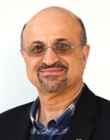 Nader
Bagherzadeh, Professor (Joint Appointment), Electrical Engineering and
Computer Science & Donald Bren School of Information and Computer Science. Nader
Bagherzadeh, Professor (Joint Appointment), Electrical Engineering and
Computer Science & Donald Bren School of Information and Computer Science.
"Machine Learning a
Paradigm Shift but has Limitations."
Abstract: In this talk,
an overview of current trends in machine learning will be discussed with an
emphasize on challenges and opportunities. Finally, there will be an
overview of our work related to this topic of research.
Bio: Dr. Nader Bagherzadeh has
been involved in research and development in the areas of computer
architecture, reconfigurable computing, VLSI chip design, and computer
graphics. For almost ten years ago, he was the first researcher working on
the VLSI design of a Very Long Instruction Word (VLIW) processor. Since
then, he has been working on multithreaded superscalars and their
application to signal processing and general purpose computing. His current
project at UC, Irvine is concerned with the design of coarse grain
reconfigurable pixel processors for video applications. The proposed
architecture, called MorphoSys, is versatile enough to be used for digital
signal processing tasks such as the ones encountered in wireless
communications and sonar processing. DARPA and NSF fund the MorphoSys
project (total support $1.5 million). Dr. Bagherzadeh was the Chair of
Department of Electrical and Computer Engineering in the Henry Samueli
School of Engineering at University of California, Irvine. Before joining
UC, Irvine, from 1979 to 1984, he was a member of the technical staff (MTS)
at AT&T Bell Laboratories, developing the hardware and software components
of the next-generation digital switching systems (#5 ESS). Dr. Bagherzadeh
holds a Ph.D. in computer engineering from The University of Texas at
Austin. As a Professor, he has published more than a hundred articles in
peer-reviewed journals and conference papers in areas such as advanced
computer architecture, system software techniques, and high performance
algorithms. He has trained hundreds of students who have assumed key
positions in software and computer systems design companies in the past
twelve years. He has been a Principal Investigator (PI) or Co-PI on more
than $2.5 million worth of research grants for developing next-generation
computer systems for solving computationally intensive applications related
to signal and image processing.
|
|
|
|
Panel #1
|
Wednesday,
October 17, at
5:00
Panel #1 |
|
|
|
Panel







|
Panel:
“AI and
Machine Learning driving the Intelligent Machines: Will the Technological
Singularity Happen?"
Abstract: Artificial intelligence (AI) will no doubt have a
significant impact on society in the coming years. But how intelligent can a
machine be? The idea that human history is approaching a “Technological
Singularity” that ordinary humans will someday be overtaken by artificially
intelligent machines has moved from the realm of science fiction to serious
debate. Some singularity theorists predict that if the field of AI and
machine learning continues to develop at its current dizzying rate, the
singularity could come about in the middle of the present century. This
panel will discuss the current state of the art for AI, deep learning and
robotics, and try to predict where this technology is heading.
Moderator: Farhad Mafie, SoC Conference Chairman.
Panelists:
1.
Professor Alexander Ihler, Associate Professor, Information & Computer
Science, UC Irvine.
2. Anil Mankar, COO & SVP Engineering, BrainChip Inc.
3. Geeta Chauhan, CTO, DeepCloud.
4.
Manoj Roge,
VP, Strategic Planning & Business Development, Achronix.
5. Nader
Bagherzadeh, Professor (Joint Appointment), Electrical Engineering and
Computer Science & Donald Bren School of Information and Computer Science.
University of California, Irvine.
6. TBA.
This
Panel Is Open To Everyone . . . Register Online for FREE Panel Pass
Several
Opportunities to Win various Prizes During this Panel Discussion . . .Don't
Miss Out!
|
|
|
|
Savant
Company Inc.

SoC Conference |
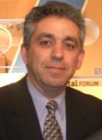 Farhad
Mafie, SoC Conference Chairman. Farhad
Mafie, SoC Conference Chairman.
Moderator
Farhad Mafie, President and
CEO of Savant Company Inc., that provides marketing and business development
services to high-tech startups and mid-size companies on a worldwide basis.
He has over 25 years of experience in high-tech industries including
semiconductor and computer businesses; additionally, he has more than 15
years of university-level teaching experience.
In 2003, Farhad designed and
developed the annual Internationals System-on-Chip (SoC) Conference,
Exhibits, and Workshops. As the SoC Conference Chairman, he drives the
Conference leading-edge annual program.
As Chief Marketing Officer (CMO)
for a Switzerland startup, Farhad is driving an innovative mobile payment
system based on selected concepts that are very similar to Blockchain.
For almost six years at
Microsemi Corporation, as Vice President of Worldwide Product Marketing and
Corporate Communications teams (in US, EU, India, and China), Farhad
developed and managed the entire Microsemi’s worldwide outbound and inbound
marketing strategies and programs; and worked directly with executive team
on M&A projects and successfully integrating over 18 acquired companies.
Farhad is also the former Vice
President of Marketing/Business Development and Technical Sales Engineering
at Toshiba America Electronic Components, Inc. He was responsible for
marketing the entire Toshiba standard ICs in North America, as well as
engineering development for Toshiba's Embedded and Digital Consumer products
& solutions based on ASSP and SoC Models.
Farhad has worked at Lucent Technologies on marketing communications ICs,
Toshiba Information Systems on product definition for Toshiba's notebooks
PCs and handheld products, Unisys on designing new processors and computer
systems, Ocean Scientific on designing medical instrumentations, and MSI
Data on designing data collection products. He has a Master of Science and a
Bachelor of Science degree in Electronic Engineering from California State
University, Fullerton.
He is an author and a
translator. In 2003, he published the biography of Iranian poet and Nobel
nominee who lived in exile, Nader Naderpour (1929-2000), Iranian Poet,
Thinker, Patriot. Farhad is also Editor-in-Chief for the CRC Press SoC
Design and Technologies Book Series, which includes (1) Low-Power NoC for
High-Performance SoC Design and (2) Design of Cost-Efficient Interconnect
Processing Units. Farhad is an active member of IEEE, and he is the chair of
IEEE Orange County Solid-State Circuits Society (SSCS), as well as IEEE
Orange County Entrepreneurs' Network (OCEN). He is also a member of two UCI
Advisory Committees: Communication System Engineering and Embedded System
Engineering Certificate Programs.
|
|
|
|
Panel #2
|
Thursday,
October 18, at
4:30
Panel #2 |
|
|
|
Panel







|
Panel:
“Are
you ready for the Blockchain of Things? Blockchain & Semiconductors Economy
– Hypes, Realities, and Opportunities."
Abstract: Blockchain is the technology at the heart of bitcoin and other
virtual currencies. It is an open and distributed ledger that can record
transactions between two parties efficiently and in a verifiable and
permanent way. What makes this system theoretically tamperproof is two
things: a cryptographic fingerprint unique to each block, and a “consensus
protocol,” the process by which the nodes in the network agree on a shared
history. Many industry analysts believe that Blockchain technology is the
solution for many of the security, privacy and reliability concerns in the
Internet of Things (IoT). The billions of smart devices coming to the IoT
could transform homes, cities and lives. But they also could create a
serious security headache. The combination of artificial intelligence, IoT
and Blockchain will bring multiple benefits across multiple industries,
leading to a whole host of IoT applications that we haven’t yet considered.
With billions of connected devices filling our homes, workplaces and cities,
security of data must keep pace. Could blockchain-based solutions offer a
viable alternative to current methods? In this panel, we will discuss hypes,
realities, and opportunities in Blockchain of Things and much more.
Moderator: Farhad Mafie, SoC Conference Chairman.
Panelists:
1. Dr.
Bhaskar Krishnamachari, Professor of Electrical Engineering & Computer
Science; Director of Center for Cyber-Physical Systems and the Internet of
Things, USC Viterbi School of Engineering.
2. Erik Saberski, Data Scientist, XYO Network.
3. Ben Taylor, CEO, LedgerDomain.
4. Raghu Bala, CEO, NetObjex.
5. 5.Eman Safadi – COO, LA Blockchain Lab & Principal, EHS Consulting.
6. Stephan Wullschleger, CTO, PBV Kaufmann.
This
Panel Is Open To Everyone . . . Register Online for FREE Panel Pass
Several
Opportunities to Win various Prizes During this Panel Discussion . . . Don't
Miss Out!
|
|
* * * * * * *
Back To The Main SoC
Conference Page
Copyright © 2003-2018 by Savant Company Inc. All
Worldwide Rights Reserved.
| |
|